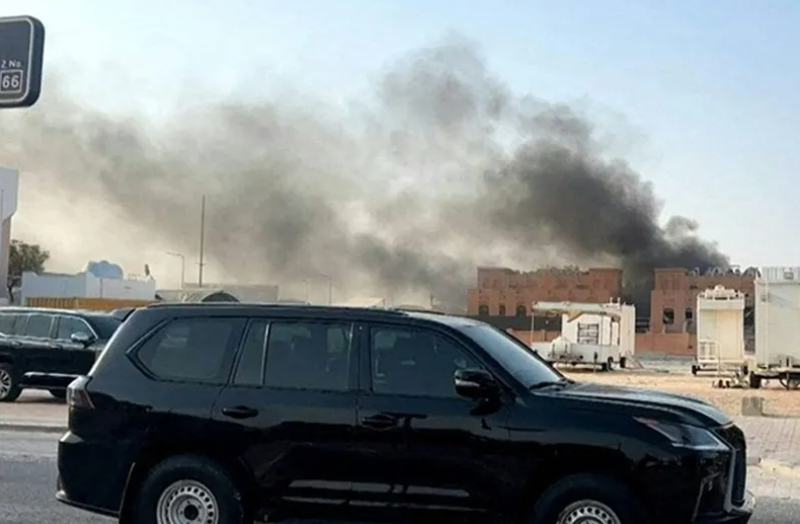‘Out-of-Bounds’ Israel Bombards Qatar, Mediator Nation — “Ceasefire Talks on the Brink of Collapse”
Input
Changed
Israel: “Precision strike on Hamas senior leadership” Trump: “Does not advance U.S. or Israeli objectives” Ceasefire negotiations in Gaza on the verge of breakdown

Israel, locked in a 23-month war with the Palestinian militant group Hamas in Gaza, has launched a precision strike against Hamas leaders residing in Doha, the capital of Qatar. This marks the first time Israel has conducted a military operation on Qatari soil, a country serving as a mediator in the ceasefire process — a move that now threatens to derail ongoing negotiations.
Israel Targets Hamas Leadership
According to Reuters and CNN on September 9, the Israel Defense Forces (IDF) bombed the residences of Hamas’ top leadership in Doha around 3:50 p.m. Witnesses reported powerful explosions and plumes of black smoke rising from the site. The IDF stated, “In cooperation with Shin Bet, our air force carried out a precision strike in Doha,” adding that “precision munitions were employed to minimize civilian casualties” and vowing to continue operations to defeat Hamas.
Although Israel has not disclosed its exact target, Middle Eastern outlet Al Jazeera reported that the strike likely aimed at a Hamas delegation dispatched for ceasefire talks. Some local media suggested Khalil al-Hayya, Hamas’ chief negotiator, may have been killed, though Hamas denied any fatalities. Al-Hayya, who met Qatari Prime Minister Sheikh Mohammed bin Abdulrahman Al Thani just a day earlier, has been at the forefront of mediation efforts.
For years, senior members of Hamas’ political bureau have operated from Doha, with Qatar hosting the group’s headquarters. Since the outbreak of the Gaza war, Qatar has mediated alongside the United States and Egypt. While Israel has previously targeted Iran-aligned militant allies of Hamas in Lebanon, Syria, and Yemen, this was its first strike inside Qatar.
Israel has long vowed to eliminate Hamas leaders abroad. In May, Defense Minister Yoav Gallant declared al-Hayya would “definitely be removed,” while IDF Chief of Staff Herzi Halevi also underscored the intent to assassinate Hamas leadership overseas.

Hamas’ “Total Hostage Release” Declaration Rejected as “Deception”
The strike threatens to upend U.S.-led mediation on a Gaza ceasefire and hostage release. Just a week earlier, on September 3, the Israeli Prime Minister’s Office dismissed Hamas’ acceptance of a mediator-proposed “60-day truce” as “mere propaganda with nothing new.” The office insisted the war would continue until all hostages were freed, Hamas disarmed, Gaza demilitarized, Israeli security control established, and a replacement civilian administration installed.
Hamas, by contrast, announced its willingness to agree to a 60-day truce, releasing 10 surviving hostages and repatriating some bodies, while moving toward a comprehensive accord to end the war. Its proposal included freeing all hostages in exchange for Palestinian prisoners, full Israeli withdrawal, border openings, and Gaza reconstruction. Hamas also pledged to establish an independent technocratic administration to govern Gaza.
Prime Minister Benjamin Netanyahu rejected the overture, calling it “yet another deception.” Gallant warned, “If Hamas does not accept our terms, Gaza City will be reduced to rubble like Rafah and Beit Hanoun.” Israel also framed the strike on Qatar as retaliation for recent Hamas attacks in Jerusalem and Gaza, stressing its legitimacy.
Trump: “Never Approved the Strike”
Israeli authorities reportedly informed the White House of the operation in advance. However, President Donald Trump distanced himself, stating he had never approved it. On September 9, Trump wrote on Truth Social: “This morning I was notified by the U.S. military that Israel was striking Hamas. I immediately instructed Special Envoy Steve Witkoff to issue a warning to Qatar, but unfortunately it was too late to prevent the attack.”
Trump continued, “We consider Qatar a strong ally and friend. I deeply regret that this happened on their soil. I want all hostages returned and the bodies of the deceased repatriated, and I want this war to end immediately.” He noted that after the attack he spoke with Netanyahu to reaffirm peace intentions, and with Qatar’s emir and prime minister to express gratitude for their support and friendship. He pledged that “such an incident will never again occur on their territory,” and ordered Secretary of State Marco Rubio to finalize a defense cooperation agreement with Qatar.
That same day, the White House voiced concern over the strike while conceding the value of eliminating Hamas operatives. Spokesperson Karoline Leavitt told reporters, “A unilateral bombing inside Qatar — a sovereign nation, a close U.S. ally, working courageously with us to mediate peace — does not advance Israeli or U.S. objectives.” Still, she noted, “Regrettably, Hamas was operating in Doha. Removing Hamas, which profits from the suffering of Gaza’s civilians, remains a worthwhile objective.” Asked whether Trump was displeased with Netanyahu’s decision, she responded, “The president has made his views and concerns on this matter very clear.”






















Comment